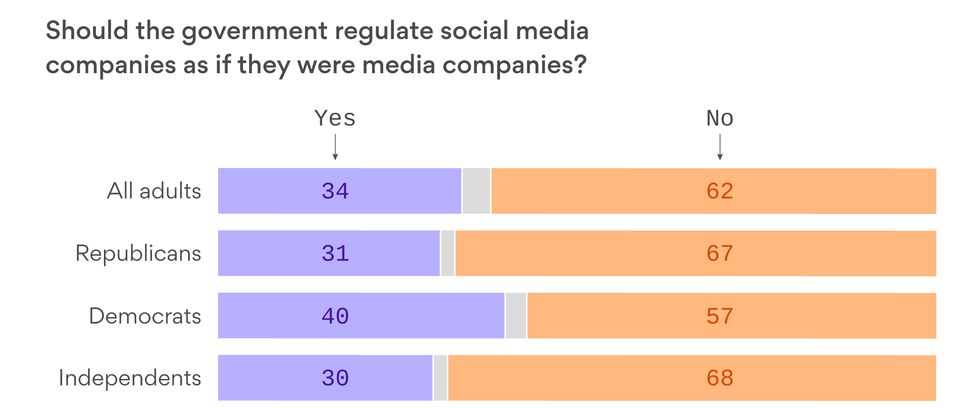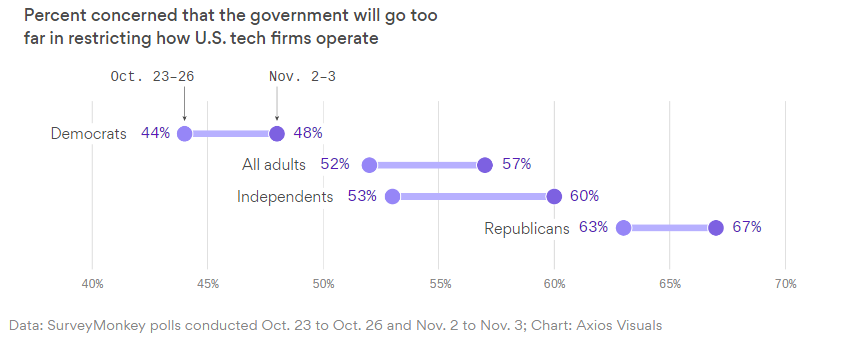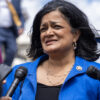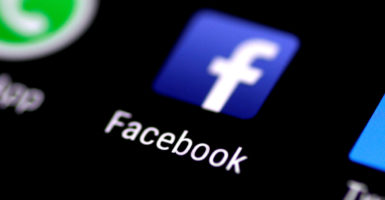Last week’s congressional hearings with Facebook, Twitter, and Google may have had the opposite effect of what lawmakers intended.
A new poll from Axios and SurveyMonkey reveals that “more Americans are now wary of the government going too far to regulate web platforms than before the hearings,” according to Axios’ David McCabe.

Representatives from Facebook, Twitter, and Google testified before three congressional committees in a two-day span last week. Members of both political parties attacked them for failing to curtail Russia’s alleged interference in the presidential election.
All three technologies companies have pledged to take steps to increase transparency of political ads and crack down on “fake” news. Those changes, however, don’t go far enough for lawmakers who proposed legislation to regulate the companies. Sens. Mark Warner, D-Va.; Amy Klobuchar, D-Minn.; and John McCain, R-Ariz., introduced the Honest Ads Act last month.
“In the wake of Russia’s attack on the 2016 election,” McCain said, “it is more important than ever to strengthen our defenses against foreign interference in our elections.”
So far, however, lawmakers haven’t discovered any evidence that Russia’s meddling on social media affected the outcome of the election.
According to Facebook’s estimates, Russian-linked content could have reached as many as 126 million users, but that content represents 0.004 percent of what those users would have seen on the platform over a two-year period. Facebook has 1.37 billion daily active users.
The Russian-linked ads reached even fewer people, and prompted former Clinton pollster Mark Penn to write in The Wall Street Journal, “You Can’t Buy the Presidency for $100,000.” Spending on the 2016 presidential race totaled $2.4 billion, according to the Center for Responsive Politics.
According to the Axios-SurveyMonkey poll, Americans are more skeptical about a government solution than the lawmakers proposing one. (See the crosstabs.)
“After the hearings,” McCabe writes for Axios, “57 percent said that they are concerned the government will go too far in regulating the operations of technology companies, up from 52 percent before the hearings.”
Those numbers are consistent across the political spectrum, although Democrats are less concerned about government regulation than Republicans and independents.

Platforms such as Facebook and Twitter have risen in popularity among Americans not just for political activity but also for news. More than a quarter of U.S. adults get their news from social media, and nearly half rely on Facebook for news, according a recent Pew Research Center report. Those platforms and others have also given more people a voice in the political process.
“[The] ability to share and express yourself is more important than any other purpose of social media,” according to one respondent of the Axios-SurveyMonkey poll. “It is the responsibility of those consuming that information to place proper perspective on what they read.”
President Donald Trump, both during his winning campaign and after, has cited his use of Facebook and Twitter as a way to bypass the media and communicate directly with the American people.
How do you fight millions of dollars of fraudulent commercials pushing for crooked politicians? I will be using Facebook & Twitter. Watch!
— Donald J. Trump (@realDonaldTrump) March 7, 2016
If the press would cover me accurately & honorably, I would have far less reason to "tweet." Sadly, I don't know if that will ever happen!
— Donald J. Trump (@realDonaldTrump) December 5, 2016
“The wariness of government regulation is widespread and bipartisan enough to be a warning to lawmakers who want to pursue it,” writes Mike Allen, co-founder of Axios.
The poll was conducted Nov. 2-3 with a sample of 5,503 people and a margin of error of plus or minus 2 percentage points.




























